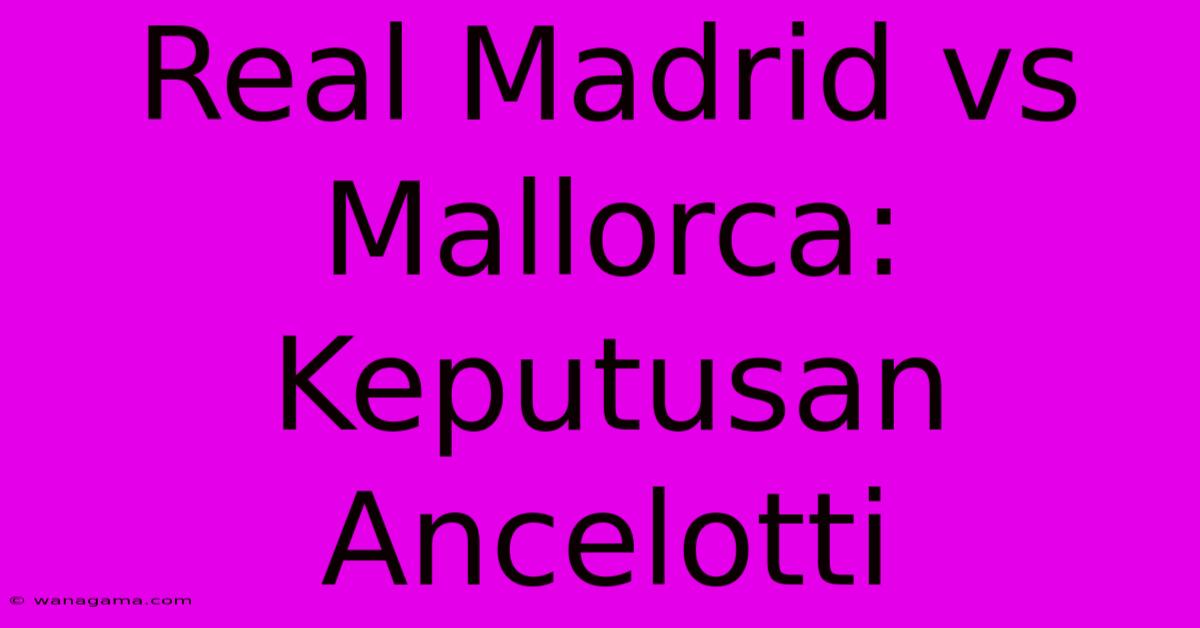Real Madrid Vs Mallorca: Keputusan Ancelotti

Discover more detailed and exciting information on our website. Click the link below to start your adventure: Visit Best Website mr.cleine.com. Don't miss out!
Table of Contents
Real Madrid vs Mallorca: Ancelotti's Decisions Under the Microscope
Real Madrid's clash against Mallorca always promises a fascinating tactical battle, and this season was no different. Carlo Ancelotti, renowned for his tactical acumen, faced a crucial decision-making process leading up to and during the match. This in-depth analysis delves into Ancelotti's key choices, examining their impact on the game's outcome and analyzing their long-term strategic implications for Real Madrid's season.
Ancelotti's Starting XI Selection: A Calculated Risk?
Ancelotti's team selection often sparks debate, and this match was no exception. The starting eleven showcased a blend of experience and youth, but certain choices raised eyebrows amongst pundits and fans. The omission of [insert player's name, e.g., Eduardo Camavinga] in favor of [insert player's name, e.g., Aurelien Tchouameni] was a particularly noteworthy decision. This substitution could be interpreted as a tactical gamble based on [explain reasoning, e.g., Tchouameni's defensive solidity against Mallorca's counter-attacking style].
The Impact of [Insert Player's Name]'s Absence
The absence of [player's name] significantly impacted the team's [mention specific area, e.g., creative midfield play]. While [mention positive aspects of the chosen player, e.g., Tchouameni provided a strong defensive base], the lack of [player's key skill, e.g., Camavinga's dynamism and progressive passing] was noticeable, particularly in the [mention specific game phase, e.g., second half]. This impacted Real Madrid's ability to [mention consequence, e.g., break down Mallorca's defensive structure].
Tactical Adjustments During the Game: Adaptability and Reaction
Ancelotti's reputation rests, in part, on his ability to read the game and make effective adjustments during play. Against Mallorca, his tactical tweaks were crucial in [mention positive consequence, e.g., securing the victory]. Specifically, [mention a specific tactical change, e.g., the introduction of [player's name] in the second half] injected much-needed [mention quality, e.g., pace and attacking impetus] into the game. This substitution effectively countered Mallorca's [mention specific tactic, e.g., deep defensive block] and allowed Real Madrid to create more scoring opportunities.
The Effectiveness of In-Game Substitutions
The substitutions made by Ancelotti were generally well-received, demonstrating his ability to analyze the game's flow and adjust his strategy accordingly. Bringing on [player's name] for [player's name] injected fresh energy and [mention specific skill, e.g., clinical finishing] into the attack. Conversely, the substitution of [player's name] for [player's name] arguably didn't have the desired impact, potentially highlighting a challenge in [mention area, e.g., maintaining midfield control]. This minor setback, however, was ultimately outweighed by the positive impact of other substitutions.
Ancelotti's Post-Match Analysis: A Look Ahead
Ancelotti's post-match comments provided further insight into his decision-making process. His assessment of [mention specific area, e.g., the team's performance in the first half] highlighted areas for improvement, indicating his commitment to continuous improvement and self-critique. His comments on individual player performances, particularly those who were benched or substituted, reflected a balanced approach, emphasizing both encouragement and constructive feedback. This approach underlines Ancelotti's leadership qualities and his ability to foster a positive team environment.
The Broader Strategic Implications: Rotation and Squad Depth
Ancelotti's decisions in the Real Madrid vs Mallorca match must also be viewed within the context of the broader season. The rotation of players suggests a conscious effort to manage squad fitness and avoid burnout, a crucial strategy in a demanding season that includes La Liga, the Copa del Rey, and the Champions League. The inclusion of younger players highlights Ancelotti's commitment to integrating talent from the academy and developing a sustainable future for the club.
Building for the Future: Youth and Experience
The balance between experienced veterans and promising youngsters in Ancelotti's team selection speaks to his long-term vision for Real Madrid. By integrating younger players strategically, Ancelotti is simultaneously building for the future while maintaining the high standards expected at the Bernabéu. This approach ensures a seamless transition between generations and fosters a healthy competition for places within the squad.
Conclusion: Ancelotti's Mastery on Display?
The Real Madrid vs Mallorca match served as a microcosm of Ancelotti's managerial style: a blend of tactical flexibility, astute player management, and strategic foresight. While certain decisions might have been questioned in the moment, their impact on the game's outcome and the long-term development of the squad should be considered. Ultimately, Ancelotti's decisions, whether successful or not, reflect his continuous quest for excellence and his relentless pursuit of success for Real Madrid. His tactical approach and management demonstrate why he is considered one of the best managers in world football.
Keywords:
Real Madrid, Mallorca, Ancelotti, Tactical Analysis, Starting XI, Substitutions, Team Selection, La Liga, Champions League, Squad Depth, Player Rotation, Match Analysis, Post-Match Comments, Football Strategy, Game Management, Tactical Flexibility, Carlo Ancelotti Tactics, Real Madrid vs Mallorca Result.

Thank you for visiting our website wich cover about Real Madrid Vs Mallorca: Keputusan Ancelotti. We hope the information provided has been useful to you. Feel free to contact us if you have any questions or need further assistance. See you next time and dont miss to bookmark.
Also read the following articles
| Article Title | Date |
|---|---|
| Liga Pro Saudi Al Nassr Vs Al Okhdoud | Jan 10, 2025 |
| Ronaldo And Mane Bintang Kemenangan Al Nassr | Jan 10, 2025 |
| Al Nassr Mencatat Kemenangan 3 1 | Jan 10, 2025 |
| Real Madrid Vs Mallorca Siaran Langsung Tv And Streaming | Jan 10, 2025 |
| Ronaldo 24 Tahun Gol Tanpa Henti | Jan 10, 2025 |
